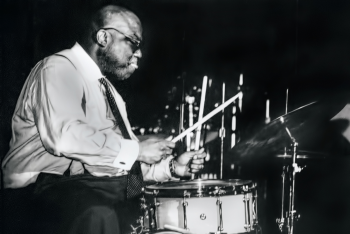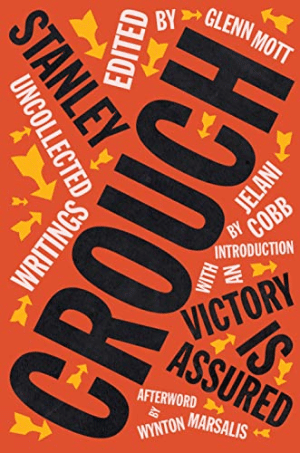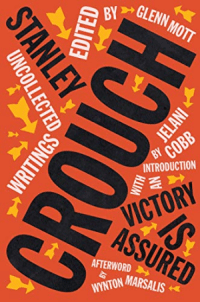.
.
Victory is Assured: Uncollected Writings of Stanley Crouch
edited by Glenn Mott
.
.
___
.
.
photo by Michael Jackson/jackojazz.com

At the drum kit…the writer Stanley Crouch
.
___
.
…..When the essayist, newspaper columnist and MacArthur Foundation genius Stanley Crouch died on September 16, 2020, jazz music lost a vital voice. He spent his life devoted to the art, once describing it as “the highest American musical form because it is the most comprehensive, possessing an epic frame of emotional and intellectual reference, sensual clarity and spiritual radiance.”
…..Often controversial and always passionate, his views on jazz, politics, and race frequently sparked outrage or applause, and were almost certain to provoke debate. He was an early advocate for and artistic consultant of Wynton Marsalis, and along with Marsalis and the writer (and Crouch mentor) Albert Murray, helped establish New York’s Jazz at Lincoln Center. These relationships and his efforts will have an impact on jazz for generations.
…..I interviewed Stanley frequently and considered him a friend, and as an early supporter of Jerry Jazz Musician, I would occasionally receive unsolicited emails from him after he read something he enjoyed on the site, telling me to “keep goin’!” and concluding each correspondence with his signature message “V.I.A.” (Victory is Assured). That sign-off was known to many, and is the title of a book of his uncollected writings, edited by his longtime friend and “American Perspectives” column editor Glenn Mott.
…..Mott writes of Crouch: “Beloved yet cantankerous, Crouch delighted and enflamed the passions of his readers in equal measure, whether writing about race, politics, literature, or music.” The book is made up of writings never before anthologized – and some were discovered on his computer, unpublished until now.
…..I had the privilege of recently interviewing Mott about Crouch and his longtime relationship with him. That interview will be published in the very near future.
…..Meanwhile, with the consent of Mott and Liveright Publishing, the following essays, excerpted from the book, take up two topics Crouch had considerable opinions about – Miles Davis and Billie Holiday.
Joe Maita
Editor/Publisher
.
.
___
.
.
Excerpted from Victory Is Assured: Uncollected Writings of Stanley Crouch edited by Glenn Mott. Copyright © 2022 by The Estate of Stanley Crouch and Glenn Mott. Used with permission of the publisher, Liveright Publishing Corporation, a division of W. W. Norton & Company, Inc. All rights reserved.
.
.
Miles Davis, Romantic Hero
Written on the occasion of Davis’s posthumous induction by Herbie Hancock into the Rock & Roll Hall of Fame, S.C. resists previous arguments regarding crossover jazz and the electronic Miles to provide a selective and nuanced consideration of Davis’s legacy as a cultural icon and the rituals of masculinity.
.
…..For the innocent listener who hasn’t been convinced by the noisy claims and special pleading for the artistic significance of jazz improvisation, Miles Davis’s My Funny Valentine is one of the most persuasive arguments. With this recording, Davis was never to be captured playing again with such virtuosic command of varied emotional detail. It is hard to imagine another rhythm section improvising with more adventurous looseness and equal sensitivity to each moment of the music, and it is equally difficult to imagine another young tenor saxophonist, unaware of the tempo and rhythmic freedom that was going to rise about him, responding with more ease, formal beauty, and eloquence than what we hear from George Coleman on selection after selection. It was, as they say in the business, “One of those nights.”
…..What made the recording so special when it came out—and makes it even more special in our decadent and pornographic moment—is the depth of its romantic feeling. There is an intimacy and a great tenderness to the music, both wounded and reverential. In 1964, this engagement in romantic expression was still relatively new because male Negro singers had only been recording romantic songs for about twenty-five years, having been forced to leave the province to Caucasians because of the sexual limits of racism. But instrumentalists had no such limitations imposed upon them. Jazzmen had used the Tin Pan Alley love song as a common form of American expression, and the most inspired of them bent the melodies until special sounds came out. The champions in the business of instrumental romance were almost always saxophone players, and the “boudoir saxophone” was a stable force in American music. A player was expected to lean his tone against a song and make it sigh with an erotic fire.
…..The command of the poetic emotion made Miles Davis the greatest player of romantic songs to emerge since World War II and the innovations of Charlie Parker. By the mid-1950s, he had come into his first period of maturity and developed a style in which his lyricism was so revealing that it brought unexpected pleasure to his listeners. Davis’s improvisation testified to his willingness to share the facts of very introspective feelings. And none of what he did seemed easy. As My Funny Valentine shows, great difficulty was audible in every musical gesture: The notes had points on them; they were slurred and bent suggestively or painfully; a tone could disappear into a sigh or begin as a pitchless whisper and tellingly work its way up into a note. This delicacy could ascend through sudden moans to yelps or descend to dark growls devoid of vibrato that were nearly embarrassing in their exposure.
…..Listening to that side of Davis’s talent is like a form of eavesdropping. The trumpet sounds are neither crass nor vulgar but are, even so, more than a bit reminiscent of the communicative noises made by lovers at close quarters. We hear clearly why Davis came to prominence in a time when the cold and removed masculinity defined by the night world of criminals and hustlers had a big influence on the Negro sense of male power, especially in the clubs where musicians plied their trade. In that night-world context, Davis’s expressive inclinations made him a symbol of tender and complex courage. Consequently, his musical presence was adored by women and envied by men.
…..Davis became a matinee idol in the mid-1950s when dark-skinned men were beginning to break through the barriers that kept them from being seen in romantic roles or thought of as superb interpreters of love songs. Davis shared this moment with Sidney Poitier and Nat Cole, but his persona included something that neither of theirs did. Following Charlie Parker, in whose band he did some of his earliest work, Davis was moody. He gave the impression that he was not even interested in being known, especially by white folks. The trumpeter was not given to any aspect of the minstrel tradition that has dogged the Negro artist for more than a hundred years and has most recently restated itself in the jigaboo antics of rap videos.
…..It was not that Davis did not smile as much as the fact that Davis, like Parker, did not consider smiling part of his job. The glowering Black trumpeter was there, in those little murky clubs from one end of the country to the other, leading a band and making beautiful music in circumstances that were about as opposed to artistic statement as one could imagine. Drinks were sold, people talked, drugs were pushed, prostitutes circulated, and the cash registers rang. At their worst, those circumstances could be as wild as any in the Old West, which is why some of the joints were referred to as “buckets of blood.”
…..Miles Davis, however, tamed those savage surroundings and made it clear that if he didn’t feel respected or comfortable he would leave, and the paying customers could have it out with the club owners. But if he stayed and felt like playing, his music did not hold back on the lyric quality. That element gave a charismatic frailness to his ballad interpretations. It was a sound that rarely arrived full-blown in American popular art, though it was strongly alluded to by actors such as Leslie Howard, who was often cast as a dreamer just a bit too soft for the world. There was an atmosphere of inevitable doom surrounding such characters, most of whom might be called “gallant fools.” Through such types a basic idea was sustained in popular art: Romance was itself a form of heroic engagement, and falling in love with an idea, a cause, or a person was an act of bravery.
…..By bringing that to his music, Miles Davis remade the expectations of the audience. As we hear throughout My Funny Valentine, the trumpeter taught his listeners that a whisper could be as powerful as a shout. A gallant fool, yes, but free of the maudlin Jell-O that usually came with the white American idea of the poetic soul. Davis was just as free, it seemed, of the pool-hall and street-corner braggadocio of the Negro hustling world. Little, dark, touchy, even evil, Miles Davis walked onto his bandstand and made public visions of tenderness that were, finally, absolute rejections of everything silly about the version of masculinity that might hobble men in either the white or the Black world. That was his power and that is what makes My Funny Valentine so uniquely touching.
.
(originally published in Slate; March 2006)
.
.
___
.
.
A Song for Lady Day
Billie Holiday was, and still remains, the greatest single musical influence on me. Lady Day is unquestionably the most important influence on American popular singing in the last twenty years.
—Frank Sinatra, 1958
.
…..Life is ultimately mysterious and indifferent about whom it gives much and from whom it expects a measure equal to its gifts. Those gifts are passed out with the same careless precision as handfuls of chicken feed hurled into a high wind.
…..Billie Holiday was obviously given much more than most, and her talent revealed itself through her intensity, her phrasing, and her control of nuance more so than the conventional strengths of big sound, great range, and stunning projection. Her voice was small, and her range was equally small. Standing next to most singers, she would never get you to put your money on her, unless you knew in advance that her emotional force and her ability to summon pathos, joy, and melancholy with naked precision would demolish almost anyone intent on making a contest out of a hazardous moment on the bandstand with her.
…..There’s the story of one performance with super virtuoso Sarah Vaughan. Vaughan was so profoundly endowed with a superior instrument that she sometimes could not avoid strutting her stuff to the point of obnoxiousness. But the ax fell. When Vaughan called up “I Cried for You,” Holiday whispered, “You done screwed up now, bitch. That’s my song.”
…..That sounds like a person who had discovered what she had and bet her life on it. In the face of virtuoso moves, Holiday was so far ahead on human feeling as to be invincible. She had learned her craft from Louis Armstrong and Bessie Smith, desiring Armstrong’s sense of time and his brilliant choice of notes as well as Smith’s big sound. She did better with Armstrong than she did with Smith, whom Langston Hughes said one could hear out on the street when she was singing in a theater before microphones had been developed to the point that Armstrong, Holiday, and Sinatra could make the most of them.
…..Neither Armstrong nor Holiday nor Sinatra was a belter or would have been much in the world of opera where size, projection, and nuance were taken to levels far beyond what one expected in popular music. Each of them brought popular music to heights of varied expression, emotional complexity, and even psychological revelation that were far beyond what had been intended by most popular composers or made functionally limited in their strident pluck by Broadway types like Ethel Merman, who was capable of shivering the timbers.
…..Holiday was so special because she imbued her performances with a tenderness so charismatic that her example and her unbending musical presence forced instrumentalists to do their best at making up melodies or coming as close to crooners as whatever talent they had made possible. One could not be completely satisfied with a brass or reed instrument unless it took on qualities close to a voice elevated by artistry of the sort that only jazz could bring to its material. This was done by combining the highest level of improvisation with the skill to fit a context and the absolutely essential ability to express oneself best by meeting the demands of the ensemble, adjusting breath by breath to where one is and to what is going on, as well as recognizing what to do with reality in motion.
…..She first appeared on record in the mid-1930s and had become a big influence on fellow singers by the end of the decade. The inarguably great Ella Fitzgerald has never failed to call Holiday the greatest jazz singer of all time. Abbey Lincoln, the only singer since Holiday who has a parallel level of feeling, of vulnerability and pathos so far from self-pity, says the same thing. Miles Davis’s sense of rhythm and tendency to float over the beat was deeply influenced by Holiday, as was the growing confidence he brought to lyrical recognition of the interwoven mystery of melancholy, frailty, and unbounded but unsentimental joy.
…..That unsentimental joy has often been misunderstood as some sort of Negro foolishness too far removed from the world of the substantial to be taken seriously. But mindless and empty-headed frivolousness is not the issue at all. Thorough acknowledgment of life’s tragic facts is what makes the art of Armstrong, of Holiday, and of many other major jazz musicians so compelling. It is much like singing a fervently happy song in the morgue not because we don’t know what awaits us, but because joy is a protest against all that would take us down. So the will to live becomes more than desperation and ascends to a combatively affirmative morale. No minor accomplishment, this may be the most impressive thing that American Negroes have offered the world at large. There can be no doubt that Billie Holiday knew how to bring it.
…..For those interested in an eloquent and perfectly clear assessment, the very best writing about Holiday’s artistry is contained in The Jazz Tradition by Martin Williams. Then there are some recordings that make it understandable what inspired all of the talk. The Essential Billie Holiday, a 1956 performance at Carnegie Hall, documents her craft at a penthouse point of perfection in which ballads, blues, and extremely hard but floating swing are as good as anything she ever recorded. Songs for Distingué Lovers from 1957, just two years before her death, finds the incomparable Lady Day at the height of her talent and possessed of a mature wisdom that one does not hear in her early work, no matter how good it might be.
…..Then there is her personal favorite, Lady in Satin, done with strings about 17 months before she died.
…..There are those who enjoy pitying Billie Holiday for the hard life that she led due to drugs, alcohol, and the rough men who were incapable of breaking her spirit.
…..But we should not be decoyed by those unpleasant truths to the extent that we miss what the great Betty Carter observed about the great Billie Holiday. “I think she was only free when she was singing. Everything else didn’t mean much except that it led up to the moment when she stepped out on that stage and became what we all wanted but only she could give us. She was free then, and everybody knew it. When someone brings that much freedom and makes you believe it, you have to get happy. You can’t help it.”
.
(originally published in The Root; July 2009)
.
.
___
.
.
Excerpted from Victory Is Assured: Uncollected Writings of Stanley Crouch edited by Glenn Mott. Copyright © 2022 by The Estate of Stanley Crouch and Glenn Mott. Used with permission of the publisher, Liveright Publishing Corporation, a division of W. W. Norton & Company, Inc. All rights reserved.
.
Click here to be taken to the book on Amazon.com
.
.
___
.
.
“A stylish butcher of sacred cows” (Salon), and self-described “radical-pragmatist”Stanley Crouch (1945–2020) was a columnist, novelist, essayist, and television commentator. A co-founder of Jazz at Lincoln Center, he is the author of eight critically acclaimed books.
.
.
Glenn Mott edited Crouch’s “American Perspectives” columns for over a decade.
.
.
___
.
.
Click here to read other book excerpts
Click here to subscribe to the Jerry Jazz Musician quarterly newsletter
Click here to help support the ongoing publishing efforts of Jerry Jazz Musician (thank you!)
.
.
.


































